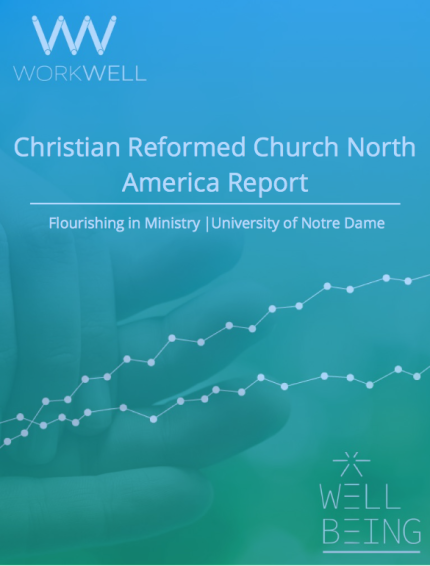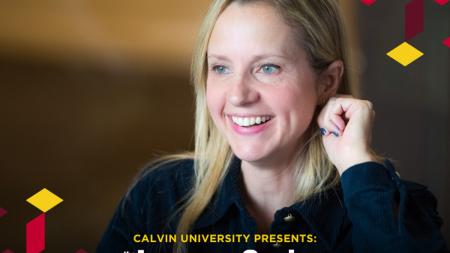Survey: CRC Clergy Show Signs of Well-Being, Satisfaction

Christian Reformed Church clergy appear to be experiencing high levels of spiritual well-being as well as satisfaction in having chosen ministry as their vocation, according to a recently released summary of results from the Christian Reformed Church Flourishing in Ministry survey.
In addition, CRC clergy who participated in the survey expressed high levels of thriving — the degree to which they experience work or other activities as positive and fulfilling —, said Rev. Chris Adams, who gave CRC leaders an overview of the results from the survey in an online presentation.
“The overall group of CRC clergy appears to be experiencing high levels of well-being. There must be significant things happening well for that to be the case,” said Adams, senior research associate for the project, which involves clergy in many denominations.
Adams is also director of the Kern Center for Vocational Ministry and an associate professor of pastoral care and counseling at Azusa Pacific Seminary.
Funded by Lilly Endowment Inc., the research project is still ongoing and is being offered by the CRC in conjunction with the University of Notre Dame. Overall, the study has surveyed more than 12,000 pastors from many denominations across North America.
The aim is to give pastors information about how to grow and thrive in their work.
In his report to CRC leaders, Adams said that the results are preliminary and that additional participants are needed in order to arrive at more definitive answers.
“Your sample size was 322 clergy, a 30-percent response rate, and given the sample size and composition, it may not be representative of your clergy as a group,” said Adams.
In addition, the sample size was not large enough to run an analysis that would give statistically significant results, he said. At least 400 are needed in order to do that type of statistical analysis.
With that in mind, Adams said the results do still give a sense of trends and of how CRC clergy compare to national averages in certain categories.
For instance, CRC clergy appear to be experiencing slightly lower levels of overall well-being than the average of the 12,000-plus pastors across North America who have taken part in the survey.
Overall well-being included such categories as satisfaction with work life, job satisfaction, burnout, resilience, satisfaction with life, general happiness, authenticity at work, job engagement, thriving, relationships, and spiritual well-being.
On a scale of 1- 5, the average for CRC clergy on “general happiness” was 3.76, compared to 3.93 for all pastors. In terms of “spiritual well-being,” CRC clergy came in at 4.68, compared to 4.62. A score of 4.0 indicates a pastor is flourishing in this area of ministry.
In the CRC survey, female clergy appear to be similar to male clergy in this area of well-being, “but the women have a higher rate of satisfaction with life in general,” said Adams.
Adams pointed out that issues related to burnout among CRC clergy — as stated in this preliminary report — appear to be slightly higher than the national average.
In the survey, more CRC clergy, on average, indicated signs of burnout, in comparison to all pastors. In addition, Adams said, “Emotional exhaustion appears to be a significant difficulty for participating CRC clergy.”
Although the numbers in each case — burnout and exhaustion — are not far off the national average, these are areas in which the CRC leadership could focus attention.
Another area to look at, he said, would be in helping clergy address financial strains.
“Many pastors who responded to the survey reported having suffered from financial strain or stress,” said Adams.
“This is often due to already existent financial stresses on the church as a whole, and is considered a problem by pastors only so much as it prevents them from fulfilling their calling to the fullest.”
CRC leaders said they appreciated hearing about the findings and noted that the denomination is already offering programs, such as Financial Shalom to support pastors financially, Pastors’ Spiritual Vitality to deepen their spiritual formation, and Peer Learning Groups to support pastors in a variety of ways in their roles as leaders. Meanwhile, Calvin Theological Seminary offers students assistance in discovering their gifts and their best fit for ministry.
But these survey findings will help leaders tease out how to help pastors do better than they already are doing — as well as assist pastors in determining ways to enhance their ministry and their personal life.
The “Flourishing in Ministry” project examines what motivates pastors to be engaged in ministry—and what disrupts them from experiencing well-being in their work, said Lis Van Harten, director of the CRC’s Sustaining Pastoral Excellence program.
CRC clergy who haven’t yet taken the survey are still invited to participate. For more details, see this webpage.
“This is a wonderful opportunity for pastors in parish ministry to get a report on their well-being — at no cost to them. Not only will participation benefit each pastor, but it'll also help the CRC as it seeks to care for its pastors,” said Van Harten.
“Congregations can also be helped by becoming more familiar with the project.”
Taking the free “Well-Being at Work” survey helps pastors assess their own goals, values, and well-being so that they can keep focused on fulfilling their calling to the fullest potential, said Van Harten.
“Twenty-five minutes is all it takes to complete the survey and instantly receive a personal well-being report — time well spent focusing on self-care,” Van Harten added.
If you want to learn more about the larger study, visit http://wellbeing.nd.edu/flourishing-in-ministry/.
Once 400 pastors have participated in the survey, a detailed report will be provided by Notre Dame and will be posted to the Sustaining Pastoral Excellence website. Hopefully this will happen in the next several months.
While individual results are both confidential and helpful to the participating pastor, the collective results and summary report will be helpful to all CRC pastors, clergy in other denominations, and the ongoing clergy well-being research.


